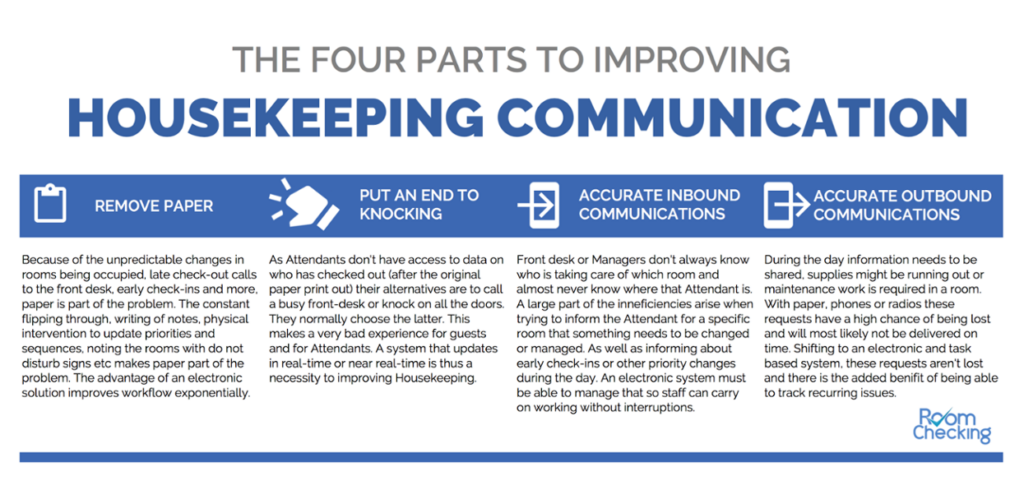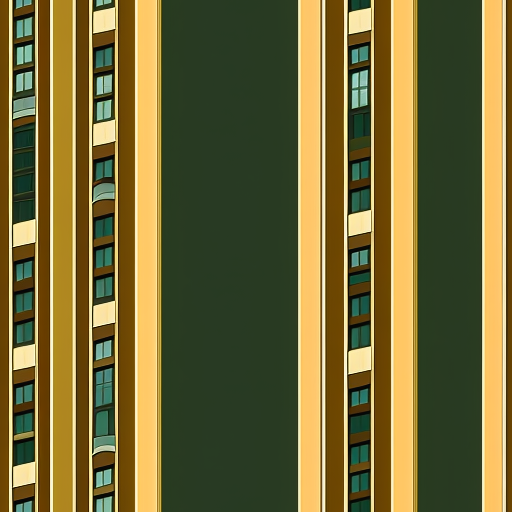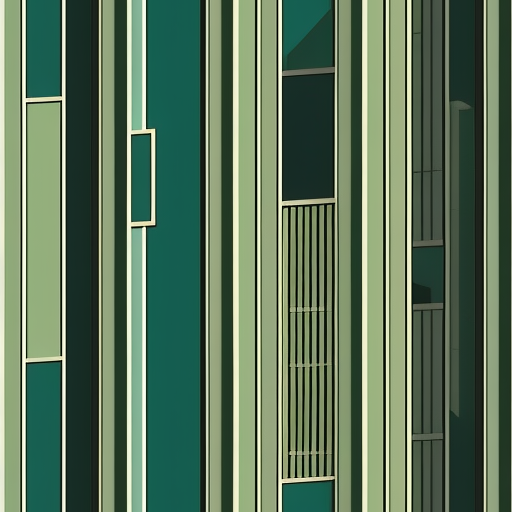
ifteen minutes for a stayover, thirty minutes for a checkout: that’s the average amount of time attendants spend to prepare a hotel room, according to industry statistics. To put things in perspective, on any given day, a fifty room hotel will only take around sixteen hours to be cleaned up completely. But does it really?
This article will focus on the time wasting habits you and your staff probably indulge in, without even realizing it, and how you can break them with the use of technology.
It’s the end of paper as we know it (and I feel fine)
According to history books, the oldest fragment of what we today know as paper dates back to the second century BC. This means over two thousand years of documents, birth certificates, wills, mortgage applications and, of course, room attendant assignment sheets.
On an interesting article published on the official Adobe blog a few years ago, Jon Perera, VP of Product Management, wrote that “ink on paper symbolizes significance, workmanship, the culmination of a long process”
and that “as a society and a culture, we’ve agreed that these milestones of our lives deserve to be recorded on paper.”
That is true, for the most part and, on a archetypal level, we all can understand and relate to the symbolism and the emotional significance that comes with written words on a physical, tangible support (reading Hemingway in hardcover is a complete different experience from doing it on a Kindle, isn’t it?) , but is that true when it comes to managing your hotel too? Well, the short answer is “no”, but let me elaborate.
The elephant in the room
When I first joined the hospitality industry, the only experiences I had in hotels were during my summer holidays or business trips. I spent most of my adult life coding and analyzing data so I knew little to nothing about the etiquette of hotels, that (I later discovered) are made of internal hierarchies, guest relationships and, of course, paper. A lot of it.
Due to my professional and academic background, I have never completely understood the whole romanticism behind it, and I judged this almost-bureaucratic way of managing internal communications as a huge obstacle to work efficiency. So, when I joined RoomChecking in 2013, I was driven by finding a way to optimize workflows that I perceived as heavy and unscalable, slow and unorganized.
From an engineering viewpoint, the amount of paper exchange between hotel departments on any given day is just unimaginable, especially when it comes to communications between housekeeping, maintenance, front desk and management.
If you’re a hotel General Manager I am sure you already monitor and track the average amount of time your attendants spend preparing a room, but have you ever analyzed how much of that time they waste flipping through sheets to browse which rooms they need to do and in what sequence? And, eventually, even when they do have the paper in order, there’s always the early check-in or the late check-out that force them to apply changes over changes to the original sequence, causing more time wasting and confusion.
The main problems with paper based housekeeping and maintenance solutions, isn't that it is paper, but rather that it isn't quite as efficient as it could be.
Improving housekeeping and maintenance efficiency doesn't need to be through an advanced system as RoomChecking, it helps, but any hotel can begin with baby steps. Creating WhatsApp groups or other simple "hacks" can already improve things.
When implementing a solution - RoomChecking or other - here are the main issues to take into account.
The Knocking Time
So, it is pretty obvious that morning routine for attendants is already hard enough: first of all the unpredictability is an intrinsic aspect of their job and, on top of that, they never know in real time if a guest has checked out or not. They arrive to the hotel, spend a tremendous amount of time doing morning briefings and preparing daily assignment sheets and then the “knocking routine” starts. Nobody likes having a complete stranger opening your door when under the shower, but this is the only way attendants have, in order to actually start working: to knock on each door to make sure guests are not in the room. How more frustrating this can get? Well, it can, because of all the departments, probably attendants have the strictest deadline: if check in time is at 2:00 PM, rooms need to be done by then, no matter what.
Inbound communications
A few years ago I was sleeping in a hotel and the receptionist was talking to someone via a walkie talkie. I found it so completely anachronistic that it almost had some kind of vintage beauty. When I asked him what he was doing, it turned out he was trying (unsuccessfully, apparently) to get in touch with the housekeeper to inform her about a guest late check out request.
As archaic as the tool might have been, I saw it as the expression of a unsatisfied demand in the industry: the need of a inbound communication system for attendants, allowing them to receive real time alerts from the front office department about priority changes (301 asked for a late checkout), generic questions (is 402 ready?) or special requests (honeymooners in 505, put a complimentary champagne bottle).
And system like this should to be simple, effective and frictionless and, honestly, a walkie-talkie just isn't that. Here is where a WhatsApp group isn't the optimum solution, because unless you know who is cleaning or preparing room 402, 505 and 301 your communications will just arrive in a large chat-room. A proper system will bring the communication to the right person and if it isn't urgent, it wont interrupt them but show it to them when they're done with what they are working on.
Are tired of staff floor never being aware of the check out?*Give RoomChecking a try now
Outbound communications
Moreover, during the day, attendants often need to communicate with other departments or with their supervisor. They might be out of supplies, notice something wrong in a room or they can simply bump into a guest that asks them a question they don’t know how to answer. When this happens, they have to stop whatever they’re doing, go to see the General Manager, inform him about the issue and then get back to work. Not only this is time consuming, but it negatively impacts the quality of work of all the departments involved. On top of that, General Managers tend to be busy people and they’re often unreachable, slowing down the whole problem solving process even more. Attendants, more than anyone working in hotels, should be able to communicate directly (and, most importantly, without stopping what they’re doing) to virtually every department. Frictionless communication is the key factor when it comes to efficiency and, usually, non verbal exchanges between hotel departments are pretty far from being efficient.
Conclusion
Mankind's most important resource is time. As Zen-ish this may sound, it happens to be true. And when it comes to business, it happens to be even truer. So being careful with this precious resource is not only advisable, it is essential. And the best way to be careful with time is to avoid to waste it. RoomChecking vision has always been about working smarter, not harder.
And not because we are lazy engineers, but because we know that once an hour is gone, it’s gone forever and, no matter how big your hotel is or how high your ADR can go, you cannot buy it back. So establishing an efficient communication system between departments is one of the most important improvement you can make in order to develop efficiency, reduce costs and improve profit.
And, not least importantly, your attendants will be grateful.


